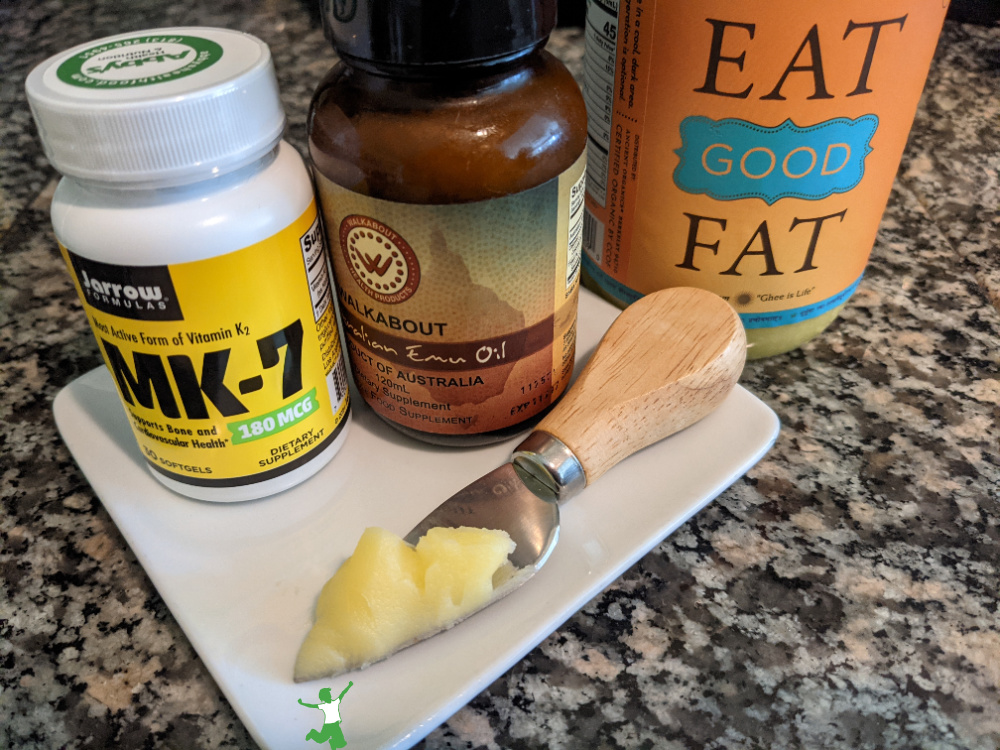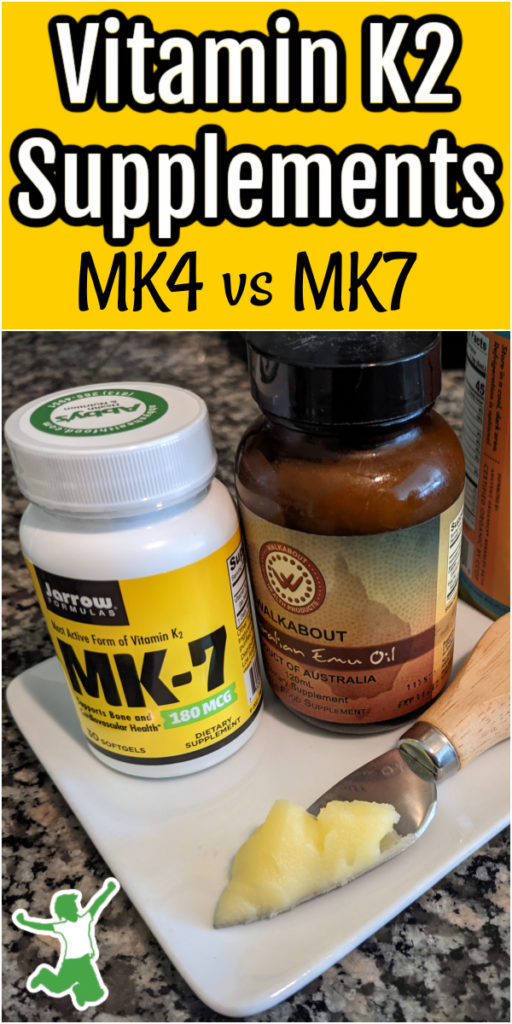Discussion of the various vitamin K2 supplements on the market with a comparison of MK-4 from animal sources or MK-7 from bacterial fermentation to ensure the diet contains sufficient amounts of this elusive yet critical nutrient.

Getting enough Vitamin K2 is absolutely essential to vibrant health. Surprisingly, the vast majority of people are seriously deficient.
Even those eating a completely whole food, organic diet, usually fall short when it comes to getting enough of either of the two major forms: MK-7 and MK-4.
Traditional Societies instinctively put great importance on foods high in Vitamin K2.
These sacred foods were consumed in larger quantities by young couples preparing to conceive.
In addition, pregnant and breastfeeding women, growing children, and the elderly received more to preserve health during these critical times of life.
Sufficient Vitamin K2 along with the other critical fat-soluble activators A and D are especially important for pregnant women to consume to ensure healthy babies.
It is important to note that Vitamin K1 from leafy greens is a different nutrient! It is not the same as Vitamin K2 found in the sacred foods of traditional cultures.
The best food sources of Vitamin K2 are grass-fed dairy products, emu oil, gouda, brie cheese, and natto, a very strong-tasting fermented soy product with roots in Japan.
Vitamin K2 from animal sources is MK-4, while K2 produced by bacterial fermentation as found in natto or cheese is MK-7.
Getting Enough Vitamin K2 in the Diet
Unfortunately, even if one consumes plenty of grass-fed dairy, getting enough K2 in the diet is still a challenge. This is due to the worrisome depletion of our soils which will take generations to repair.
Consider that the spring butter of the traditional Alpine living Swiss was an orange color. Grass-fed spring butter today is at best deep yellow.
No doubt, the soil that produced the rapidly growing spring grass that the Alpine cows grazed upon was much higher in nutrients to produce orange butter which the Swiss reverently placed in bowls with wicks to burn in their Churches.
K2 Is Not Recycled by the Body like K1
One factor contributing to widespread Vitamin K2 deficiency is the apparent lack of recycling of this nutrient by the body.
This is in contrast to Vitamin K1 from leafy green vegetables, which can be reused metabolically.
This means that Vitamin K2 stores can be quickly depleted with invisible deficiency occurring in as little as 7 days.
This is concerning especially if you are taking Vitamin D or calcium supplements. Sufficient K2 is necessary to prevent arterial calcification when the intake of these synergistic nutrients is high.
K2 Supplements Bridge the Dietary Gap
While it is always best to strive to get your nutrients from food, the critical nature of Vitamin K2 and the depletion of our soils indicates to me that supplementation is a good idea.
I did not feel certain that we could get enough K2 by eating reasonable amounts of whole and even sacred foods from grass-fed sources like Traditional Societies would have obtained by eating a similar diet.
Based on population studies and data obtained from Vitamin K2 doses given in clinical trials, it seems that 45 mcg/day would be the minimal dose needed for any sort of therapeutic effect.
Several hundred mcg/day is a better target as this is what frequent natto eaters in Japan consume.
The good news is that Vitamin K2 has no known toxicity. Thus, adding a daily supplement taken with food to improve absorption has no downside.
MK-7 vs MK-4
If you decide that taking a Vitamin K2 supplement makes sense to you, which should you choose?
If given the choice, I prefer MK-4, the animal form of Vitamin K2 over MK-7, the form of K2 from bacterial fermentation.
I get MK-4 in my diet by cooking frequently with pastured ghee, the clarified form of butter. I also eat plenty and a wide variety of cheeses along with pastured butter and eggs.
MK-4 from Food
When it comes to the animal form of Vitamin K2…MK-4…you really must get it from Real Food. The best sources are grass-fed butter, emu oil, ghee, goose liver, cheese, and pastured egg yolks.
I cannot stress enough that these are critical whole foods in your diet.
You cannot rely on a supplement form of MK-4, known as menatetrenone, because it is synthetic.
This is similar to the widespread issue of synthetic vitamin C supplements. Incidentally, folic acid is synthetic too (you want folate).
Synthetic MK-4
The supplement form of MK-4 is commonly extracted from tobacco, most likely of GMO origin (90% of tobacco crops are genetically modified).
It is not the same MK-4 as found in grass-fed butter oil, eggs, goose liver, gouda cheese, or pastured emu oil.
Supplement manufacturers rely on synthetic MK-4 because it would be prohibitively expensive to obtain this nutrient from whole food sources.
MK-4 in the Blood
Another big downside of synthetic MK-4 is the very short time it remains in the body.
For this reason, dosing every few hours is necessary to maintain therapeutic levels in the blood.
This is a very inconvenient aspect of these supplements that is rarely understood by consumers looking for therapeutic benefits.
Natural MK-7 Supplements
While MK-4 supplements are synthetic, MK-7 supplements produced via fermentation are not.
Thus, when it comes to supplementing with Vitamin K2, MK-7 is the safest and most effective form to take.
For example, this brand of Vitamin K2 is derived from nonGMO natto. My family has relied on it for many years.
If you enjoy the unusual flavor of this Japanese traditional food, I recommend natto fried rice as perhaps the best-tasting dish.
For those who are avoiding even fermented forms of soy, this Vitamin K2 from fermented chickpeas is a good brand to consider.
Blood Levels of MK-7
A huge benefit of supplementing with MK-7 is that it stays in therapeutic doses in the blood much longer than synthetic MK-4.
As a result, a once-a-day supplement of MK-7 is sufficient.
This is a very effective addition to the natural MK-4 from a diet high in grass-fed dairy and other sacred foods.
Summary. You Need BOTH MK-4 and MK-7
Getting enough of the natural, fermented form of Vitamin K2 in the diet via quality MK-7 supplements is a great strategy. To this end, I take this brand of Vitamin K2 derived from nonGMO natto.
However, it is critical to ensure you are also getting plenty of the animal form of Vitamin K2…MK-4…via whole foods.
The best MK-4 sources include cheese, pastured butter (especially ghee or raw butter oil), emu oil, goose liver, and pastured egg yolks.
Cheese from the milk of pastured cows is a particularly special source of Vitamin K2 because both MK-4 and MK-7 are in the same food!
Be sure to read labels and avoid MK-4 supplements as they are synthetic. I’ve seen at least one brand that lists menatetrenone as Vitamin K2 and not specifically MK-4, so buyer beware!
When it comes to the amount of Vitamin K2 you might need every day to maintain strong teeth, bones, and plaque-free arteries, I strongly recommend the book Vitamin K2 and the Calcium Paradox by Dr. Kate Rheaume-Bleue BSc, ND.
She discusses the daily dosage needed for healthy people versus those who need to reverse arterial calcification, osteoporosis, and other degenerative issues.

References
(1) Vitamin K2 and the Calcium Paradox by Dr. Kate Rheaume-Bleue BSc, ND
(2) Nutrition and Physical Degeneration, by Dr. Weston A. Price
(3) Menatretnone
More Information
The Latest Scoop on K2 Wonder Nutrient
The Vitamin Deficiency That Shows on Your Face
Nightshade Vegetables and Pain








I just was wondering, if you can’t consume soy in any form, or dairy or beef, what can you do to get vitamin K-2? I have eosinophilic esophagitis, and get migraines, and both are triggered by soy, and the EoE is triggered by beef and dairy.
No. The K2-Mk7 in natto comes from the fermentation, not from the soy directly.
I take Calcium with Vitamin K2.
Vitamin K2 helps direct calcium to the bones and teeth(where it belongs), keeping the calcium from attaching itself to the arteries.
Natural sources are Natto, egg yolk, butter…problem is I don’t like the cholesterol in egg yolk and butter and I don’t like the taste of Natto.
I found this online and order it online as well http://tinyurl.com/q8fjc93
It is made in USA; head office is in California. That’s why delivery and handling is free in USA. Delivery took about 3 to 7 days. It has Omega 3+ as well as CoQ10 and Vitamin K2 and it is Extended release(long-term effect).
Great write-up. I was examining regularly this weblog and I am amazed!
Particularly practical details specially the last aspect I treatment for this kind of info
much. I was searching for this individual facts for a incredibly long time.
Thank you and superior luck.
I just want to say that I’ve been taking Dr Thorne’s MK-4 liquid drops and have seen a huge improvement in my teeth. I wear retainers at night and noticed they have been fitting much tighter since taking it. I suffered from receding gums/ bone loss in the jaw from stress and this supplement is reversing the symptoms very well. I have not tried MK-7. I also have green pastures clo/ butter oil and don’t notice the effects that Thorne’s supplement does. Also no tartar on the back of my teeth. I take 4 drops in the morning and 4 at dinner. I also take vitamin D3 once a day so they can work together. Other improvements I’ve seen: better skin, less fine lines, less joint pain, better memory. I would like to try the MK-7 to see how it compares, but the 4 is working great, and even if it is synthetic, is that a bad thing?
What is your daily dosage of thorne drops
I’m late to this party, too, but while shopping for MK-7 supplements on Amazon I read a review mentioning that Nutrigold’s formula is 100% from natto (fermented non-GMO soybeans) in a base of organic olive oil. It costs less (right now, anyway) than Jarrow. I have no idea if Nutrigold is as reputable as Jarrow–do you? Recommendations are so helpful!
I have also bought Nutrigold’s. The information on their k2 looks like a quality product.
Hi Sarah,
From which age is it possible to supplement my daughter with Jarrow’s? And what is the right dose for her? She’s now 17 months old.
You should not be giving off the counter vitamins to your child without doctor’s approval (vitamins which haven’t been thoroughly tested by an independent body). The K2 for kids comes from mother’s milk. This is why children in indigenous tribes are getting breastfed for over 2 years of age.
I just bought the MK-7 from Jarrow’s but really considering the MK-4 from Thorne. I am already taking FCLO and Butter Oil from Green Pasture and my main goal is to reduce plaque, it seems that the MK-4 is best at doing just that while the MK-7 targets a wider range of benefits. This is based on the hundreds of comments/testimonies read online.
MK-4 supplements are synthetic. If you want MK-4, best to get that from food like grassfed butter, goose liver pate.
I’m currently pregnant and it was recommended I start a vitamin d/k2 supplement. I was unaware of mk-4 vs mk-7 when I ordered the Thorne drops. So my question is, is there a risk to continuing to use the Thorne drops several times per day until my bottle is out and then switching to a product like Ortho-Molecular vitamin d/k2 drops who uses mk-7? I’ve been unable to find any research online re: mk-4 and pregnancy.